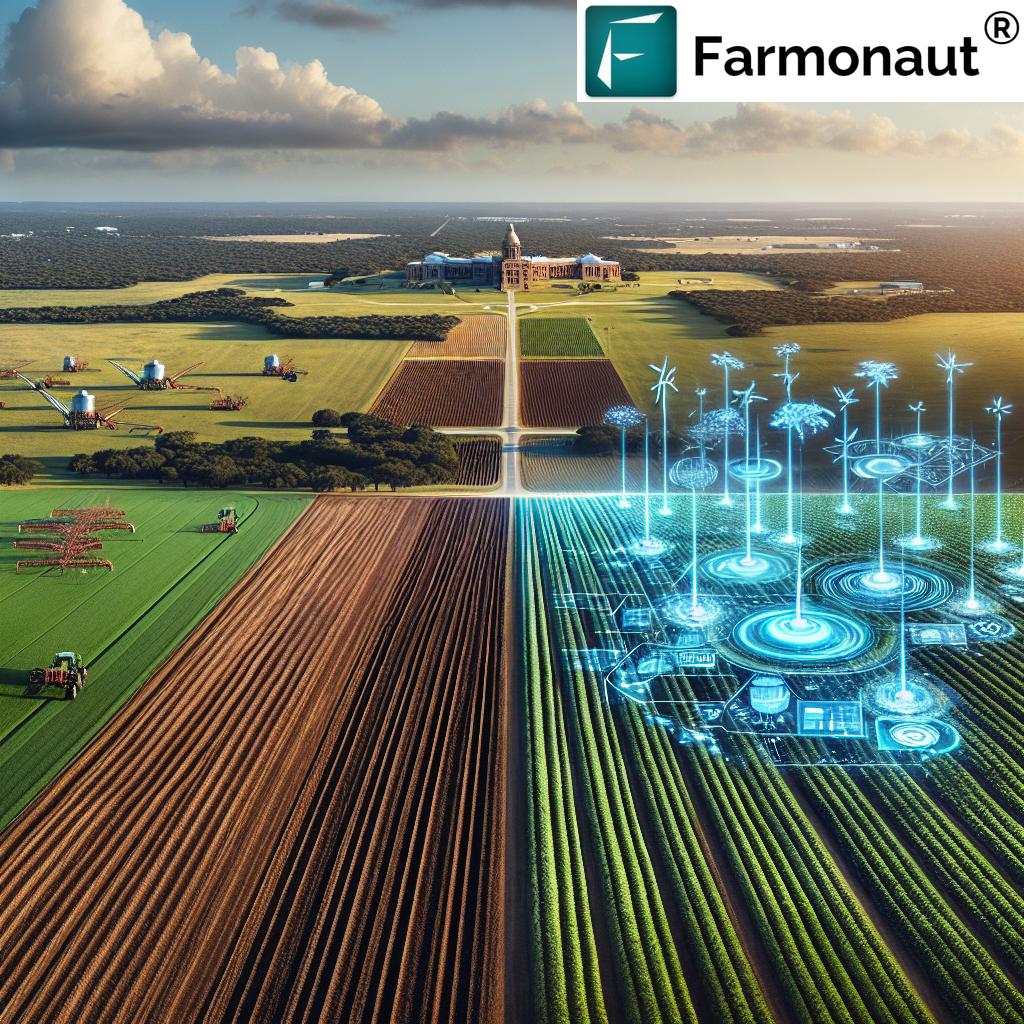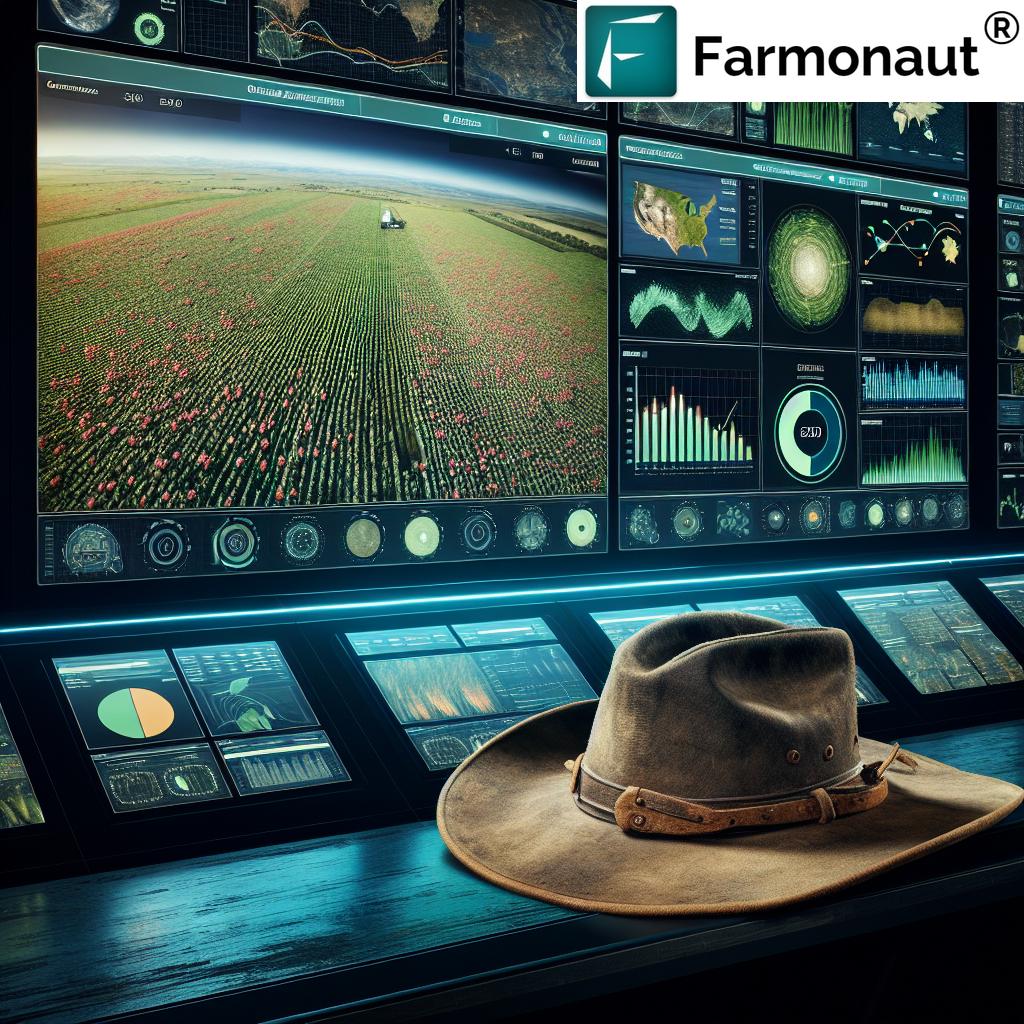Revolutionizing Texas Agriculture: How Precision Farming Technology is Shaping Sustainable Policies
“Texas agriculture contributes over $100 billion annually to the state’s economy, with precision farming playing an increasing role.”
As we delve into the evolving landscape of agriculture policy in Texas, we find ourselves at the cusp of a technological revolution that promises to reshape the future of farming in the Lone Star State. With the recent announcement of a new agriculture secretary nominee, the spotlight is on how precision agriculture technology and sustainable farming practices will influence the policies that govern our agricultural sector.
In this comprehensive exploration, we’ll examine how the integration of cutting-edge technologies is not only transforming the way we farm but also how it’s influencing policy decisions at the highest levels of government. From the rolling plains of the Panhandle to the fertile valleys of the Rio Grande, Texas farmers and ranchers are embracing innovation to meet the challenges of the 21st century.
The Changing Face of Texas Agriculture
Texas has long been synonymous with vast ranches and sprawling farms. However, the agricultural landscape is rapidly evolving, driven by the need for more efficient and sustainable practices. As we witness this transformation, it’s crucial to understand the role that technology plays in shaping both the industry and the policies that govern it.
- Adoption of precision farming techniques
- Integration of smart irrigation solutions
- Implementation of advanced crop monitoring systems
- Utilization of agricultural data analytics
These technological advancements are not just changing how we farm; they’re also influencing how policymakers approach agricultural development strategies. With the new administration taking shape, we anticipate a renewed focus on leveraging technology to address the challenges facing Texas agriculture.

The Role of Precision Agriculture in Policy Formation
Precision agriculture is at the forefront of the agricultural revolution in Texas. By harnessing the power of satellite imagery, GPS technology, and advanced sensors, farmers can now make data-driven decisions that optimize crop yields while minimizing resource use. This shift towards precision farming is not going unnoticed by policymakers.
We’re seeing an increasing emphasis on policies that support:
- Investment in farm management software
- Development of climate-resilient agriculture techniques
- Promotion of soil health analysis programs
- Expansion of broadband access in rural areas to support digital agriculture
As these technologies become more prevalent, we expect to see policy initiatives that encourage their adoption and provide support for farmers transitioning to these modern methods.
Sustainable Farming Practices: A Policy Priority
Sustainability is no longer just a buzzword; it’s becoming a cornerstone of agricultural policy in Texas. With increasing concerns about water scarcity, soil degradation, and climate change, policymakers are looking to sustainable farming practices as a way to ensure the long-term viability of the state’s agricultural sector.
“Precision agriculture can reduce water usage by up to 30% in Texas, where 80% of water is used for irrigation.”
This shift towards sustainability is reflected in emerging policies that focus on:
- Water conservation through precision irrigation
- Soil health management and regenerative agriculture
- Carbon sequestration initiatives
- Promotion of biodiversity and ecosystem services
By aligning policies with sustainable practices, Texas is positioning itself as a leader in environmentally conscious agriculture. This approach not only benefits the environment but also helps farmers reduce costs and improve their bottom line.
The Impact of Agricultural Data Analytics on Policy Decision-Making
In the era of big data, agricultural data analytics are playing an increasingly important role in shaping policy decisions. By leveraging vast amounts of data collected from farms across the state, policymakers can make more informed decisions about resource allocation, disaster response, and long-term planning.
Key areas where data analytics are influencing policy include:
- Crop yield forecasting and food security planning
- Risk assessment for crop insurance programs
- Targeted subsidy and support programs
- Environmental impact assessments
As the use of data analytics becomes more sophisticated, we can expect to see policies that encourage data sharing and collaboration between farmers, researchers, and government agencies. This collaborative approach will be crucial in addressing complex challenges facing Texas agriculture.
Smart Irrigation Solutions: A Policy Focus for Water Conservation
In a state where water is a precious resource, smart irrigation solutions are becoming a key focus of agricultural policy. These technologies allow farmers to apply water precisely where and when it’s needed, significantly reducing waste and improving crop yields.
Policy initiatives in this area may include:
- Incentives for adopting smart irrigation systems
- Research funding for drought-resistant crop varieties
- Development of water markets and trading schemes
- Integration of weather forecasting with irrigation scheduling
By prioritizing smart irrigation in policy decisions, Texas can address water scarcity issues while supporting the growth of its agricultural sector.

The Role of Farm Management Software in Policy Implementation
Farm management software is becoming an essential tool for modern farmers, and policymakers are taking notice. These platforms offer a comprehensive approach to farm operations, integrating everything from crop planning to financial management.
Policy considerations related to farm management software include:
- Standardization of data formats for easier reporting and compliance
- Cybersecurity measures to protect sensitive farm data
- Integration with government systems for streamlined subsidy applications
- Support for small and medium-sized farms in adopting these technologies
As these software solutions become more prevalent, we can expect policies that facilitate their adoption and ensure they are accessible to farmers of all sizes.
Climate-Resilient Agriculture: Adapting Policies for a Changing Environment
With the increasing impacts of climate change, developing climate-resilient agriculture strategies is becoming a critical policy focus. Texas farmers are on the front lines of climate change, facing challenges such as more frequent droughts, extreme weather events, and shifting growing seasons.
Policy initiatives in this area may include:
- Research funding for climate-adaptive crop varieties
- Support for diversification of farm operations
- Development of early warning systems for extreme weather events
- Incentives for practices that increase carbon sequestration
By focusing on climate resilience, policymakers can help ensure the long-term sustainability of Texas agriculture in the face of environmental challenges.
Soil Health Analysis: A Foundation for Sustainable Agriculture Policies
Soil health analysis is emerging as a cornerstone of sustainable agriculture policies in Texas. Healthy soils are essential for productive farming, carbon sequestration, and water retention. As such, policymakers are increasingly recognizing the importance of soil health in their agricultural development strategies.
Policy areas related to soil health include:
- Incentives for soil conservation practices
- Development of soil health monitoring networks
- Integration of soil health metrics into land valuation
- Education and outreach programs on soil management
By prioritizing soil health in agricultural policies, Texas can ensure the long-term productivity and sustainability of its farmlands.
The Intersection of Precision Agriculture and International Trade Policies
As Texas agriculture becomes increasingly high-tech, it’s also becoming more competitive on the global stage. This intersection of precision agriculture and international trade presents both opportunities and challenges for policymakers.
Key considerations in this area include:
- Harmonization of data standards for international markets
- Promotion of Texas agricultural technology exports
- Addressing concerns about data ownership and privacy in international trade
- Leveraging precision agriculture to meet international quality standards
As we navigate these complex issues, policies that support Texas farmers in accessing global markets while protecting their interests will be crucial.
The Role of Farmonaut in Supporting Texas Agriculture
As we discuss the technological revolution in Texas agriculture, it’s important to highlight the role of innovative companies like Farmonaut. While not directly involved in policy-making, Farmonaut’s advanced satellite-based farm management solutions are helping Texas farmers embrace precision agriculture and adapt to changing policies.
Farmonaut offers:
- Real-time crop health monitoring
- AI-based advisory systems
- Resource management tools
- Blockchain-based traceability solutions
These technologies align with many of the policy priorities we’ve discussed, such as water conservation, sustainable farming practices, and data-driven decision-making. By providing affordable access to advanced agricultural technologies, Farmonaut is helping Texas farmers stay ahead of the curve as policies evolve.
For more information on how Farmonaut can support your farming operations, visit their website or explore their mobile apps:
The Future of Agricultural Policies in Texas
As we look to the future, it’s clear that agricultural policies in Texas will continue to evolve alongside technological advancements. The integration of precision farming techniques, sustainable practices, and data-driven decision-making will shape the way we approach agriculture in the coming years.
Key trends we expect to see in future policies include:
- Increased support for digital literacy programs in rural communities
- Development of regulatory frameworks for emerging technologies like drones and AI in agriculture
- Greater emphasis on public-private partnerships to drive innovation
- Integration of agricultural policies with broader environmental and economic initiatives
As these policies take shape, it will be crucial for farmers, policymakers, and technology providers to work together to ensure that Texas agriculture remains competitive, sustainable, and resilient in the face of future challenges.
Potential Policy Impacts on Precision Agriculture
| Technology Area | Current Status | Potential Policy Impact |
|---|---|---|
| Crop Monitoring Systems | Growing adoption, primarily among large farms | Increased funding for research and development; incentives for small farm adoption |
| Smart Irrigation Solutions | Moderate adoption, driven by water scarcity concerns | Mandatory water use reporting; tax credits for efficient systems |
| Farm Management Software | Varied adoption, with larger operations leading | Standardization of data formats; cybersecurity regulations |
| Soil Health Analysis | Increasing awareness, but limited widespread use | Integration into conservation programs; soil health monitoring requirements |
| Agricultural Data Analytics | Growing rapidly, with significant potential | Data sharing initiatives; privacy protection laws |
Conclusion: Embracing Innovation for a Sustainable Agricultural Future
As we’ve explored throughout this article, the future of Texas agriculture lies at the intersection of innovative technology and forward-thinking policies. The adoption of precision farming techniques, sustainable practices, and data-driven decision-making is not just a trend—it’s a necessity for ensuring the long-term viability of our agricultural sector.
We’ve seen how technologies like crop monitoring systems, smart irrigation solutions, and farm management software are transforming the way we approach farming. These innovations, supported by thoughtful policies, have the potential to address some of the most pressing challenges facing Texas agriculture, from water scarcity to climate change.
As policymakers continue to shape the future of agriculture in Texas, it’s crucial that they consider the role of technology in achieving sustainable and productive farming practices. By fostering an environment that encourages innovation, supports farmers in adopting new technologies, and prioritizes sustainability, we can ensure that Texas remains a leader in agriculture for generations to come.
The revolution in Texas agriculture is well underway, driven by the power of precision farming technology and shaped by sustainable policies. As we move forward, the collaboration between farmers, technology providers like Farmonaut, and policymakers will be key to realizing the full potential of these advancements and securing a thriving agricultural future for the Lone Star State.
FAQ Section
Q: How is precision agriculture changing farming in Texas?
A: Precision agriculture is revolutionizing farming in Texas by allowing farmers to use data-driven insights to optimize crop yields, reduce resource waste, and improve overall farm efficiency. Technologies such as GPS-guided tractors, drone imagery, and soil sensors are enabling farmers to make more informed decisions about planting, irrigation, and harvesting.
Q: What role does satellite technology play in modern Texas agriculture?
A: Satellite technology plays a crucial role in modern Texas agriculture by providing farmers with real-time data on crop health, soil moisture levels, and weather patterns. Companies like Farmonaut offer satellite-based crop monitoring services that help farmers make timely decisions about irrigation, fertilization, and pest control.
Q: How are sustainable farming practices being incorporated into Texas agricultural policies?
A: Texas agricultural policies are increasingly focusing on sustainable farming practices, including water conservation, soil health management, and carbon sequestration. Policymakers are developing incentives for farmers to adopt these practices and integrating sustainability metrics into agricultural development strategies.
Q: What is the impact of climate change on Texas agriculture, and how are policies addressing this?
A: Climate change is affecting Texas agriculture through increased frequency of droughts, extreme weather events, and shifting growing seasons. Policies are being developed to support climate-resilient agriculture, including research funding for drought-resistant crops, early warning systems for extreme weather, and incentives for practices that increase farm resilience.
Q: How can small farmers in Texas benefit from precision agriculture technologies?
A: Small farmers in Texas can benefit from precision agriculture technologies by improving their crop yields, reducing input costs, and making more informed decisions. While some technologies may have high upfront costs, services like Farmonaut offer affordable solutions that can help small farmers access the benefits of precision agriculture. Additionally, policies are being considered to support small farmers in adopting these technologies.



















